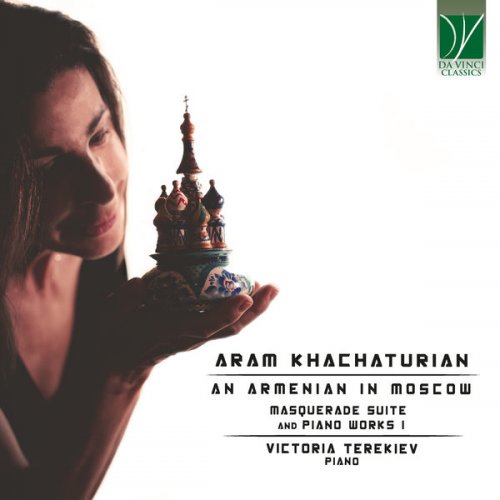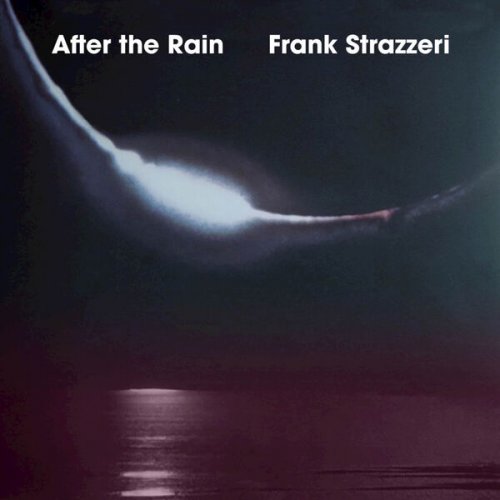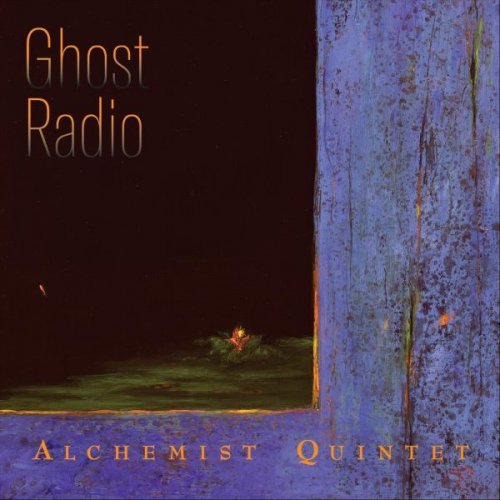Artist:
Victoria Terekiev
Title:
Aram Khachaturian: An Armenian in Moscow - Masquerade Suite and Other Piano Works I
Year Of Release:
2022
Label:
Da Vinci Classics
Genre:
Classical
Quality:
FLAC (tracks)
Total Time: 1:06:30
Total Size: 216 MB
WebSite:
Album Preview
Tracklist:01. Two Pieces: I. Waltz- Caprice
02. Two Pieces: II. Dance
03. Poem
04. Children's Album Book 1: No. 1, Andantino
05. Children's Album Book 1: No. 2, No Walk Today
06. Children's Album Book 1: No. 3, Lyado Is Ill
07. Children's Album Book 1: No. 4, The Birthday
08. Children's Album Book 1: No. 5, Étude
09. Children's Album Book 1: No. 6, A Musical Picture
10. Children's Album Book 1: No. 7, Invention
11. Children's Album Book 1: No. 8, Fuga
12. Children's Album Book 1: No. 9, Horseman's March
13. Children's Album Book 1: No. 10, In Folk Style
14. Toccata
15. Sonatina: I. Allegro Giocoso
16. Sonatina: II. Andante Con Anima, Rubato
17. Sonatina: III. Allegro Mosso
18. Masquerade Suite: I. Waltz
19. Masquerade Suite: II. Nocturne
20. Masquerade Suite: III. Mazurka
21. Masquerade Suite: IV. Romance
22. Masquerade Suite: V. Galop
How important is a composer’s biography for the aesthetical evaluation of his or her oeuvre? And, more to the point: how important are their political views in order to appreciate the artistic value of their output? At first sight, one would be tempted to say that politics has nothing to do with music, and that a composer’s private opinions about national and international affairs have no bearing on the quality of what he or she composes. And indeed this may be the case in most situations. Still, exceptions need to be made, and perhaps the case of Aram Khachaturian is one of these. Few could doubt, for instance, that Richard Wagner was one of the greatest composers of the nineteenth century; yet, especially in recent times, his music has occasionally been censored due to Wagner’s antisemite views, which anticipated, and perhaps influenced, the rise of Nazism in Germany. No Nuremberg process has ever taken place as concerns the crimes of Soviet communism, but most historians acknowledge Stalinism as no less wicked a regime than that of the Nazis. And, as was the case with the Nazis, the regime employed many forms of propaganda, including – both as concerns Nazi Germany and the USSR – a pronounced role for music.
And Aram Khachaturian was at the forefront of the USSR musical organisation, the “Composers’ Union”, for many years, presiding it and actively engaging in it. To be sure, Khachaturian was also one of the victims of the cultural purge enacted by Zhdanov during the darkest hours of Stalinism, so it can be argued that Khachaturian’s loyalty to the Party did not extend to its most extreme positions. Still, even though Khachaturian had the honour of sharing the “excommunication” dictated by the Party with such great artists as Prokofjev or Shostakovich, his position toward communism, the communist regime and the communist policies was never as nuanced and problematic as that of his above-mentioned colleagues.
It should be said, however, that in his capacity as the chief bureaucrat of music in the USSR, Khachaturian substantially attenuated the regime’s interventions in the artistic field. Whilst “processes” to musical styles continued to be held, and great composers such as Schnittke or Gubaidulina had frequently to suffer for them, the most extreme forms of Soviet persecution did not normally strike the composers, and this may be due to Khachaturian’s soft power.
But this all would be scarcely relevant to a presentation of Khachaturian’s own musical output, were it not for the fact that his music does mirror the Soviet ideology, its artistic dictates, and its perspectives. This does not yet imply a judgment of value; but it needs to be known in order to understand the reasons for some of his artistic choices, and why they were so appreciated in his cultural context.
Built on Marxist ideology, one of the main tenets of the Soviet Union was a firm belief in progress. Humankind, led by the Communist Party, was advancing on a path of irrevocable betterment; and even though the current times could be fraught with hardships (as doubtlessly were the times of World War II), the final outcome of all struggles would be a new, perfect, joyful and happy humankind. While some Western composers were adopting harsh, dissonant, doleful musical languages in order to express the (seemingly) senseless suffering of the war years, or the lack of ideals shared by many modern people, Soviet composers were practically forced to adhere to this positive and positivist aesthetics. Their music had to be uncomplicated, easy to listen to, with a tinge of localism (which helped build a sense of nation) but without too strong a characterisation (in order to promote Communist internationalism), and, above all, optimistic.
This could not be accepted by musicians such as Denisov, Volkonsky, or the already-mentioned Schnittke and Gubaidulina, who never submitted to these aesthetic principles. Others, such as Shostakovich, managed to find a way of their own, in which the official dictates were seemingly observed, but, in fact, ridiculed through musical satire and sarcasm.
The great question surrounding Khachaturian’s music can therefore be formulated as such: was he a great composer who happened to have an optimistic, positive vein of his own, and whose sunny mood happened to coincide with the Party’s regulations? Or was he a musician who bent his talent to the requirements of Soviet Communism?
This question will not be answered in these liner notes, since it is the listener who must find his or her answer by directly questioning Khachaturian’s music, with an unprejudiced ear. And this is one reason why this Da Vinci Classics album is a particularly welcome addition to the discography of the Soviet era. In fact, in the end music must speak for itself, and tell us personally about its composer’s value.
An unquestionably positive aspect of Khachaturian’s personality and music was his interest in music pedagogy. Indeed, this was also one of the doubtlessly positive aspects of the USSR, where thousands (!) of music schools allowed millions of children, throughout the country, to be educated in music. From them, some of the finest musicians of the twentieth century would stand out. Khachaturian tirelessly championed musical education, both as a teacher (at the two main institutions of the Moscow panorama, the Gnessin Institute and the Conservatory) and as a composer (and, of course, as a politician of music). Khachaturian was aware of the value of musical education, and, paradoxically, of early musical education, precisely because, as a musician, he was a latecomer. Of course, at the time of Khachaturian’s childhood in what is now Armenia, the Soviet Union did not yet exist. The city of Tbilisi where he spent his earliest years was ebullient with musical experiences, but not yet with “classical” music. As a child, Khachaturian was exposed to many musical inspirations, which he would later (but cautiously) resume in both ethnomusicological studies and as the rough matter for his own works. He began his serious music education at the late age of nineteen, when he arrived in Moscow following his elder brother, who was also active in the performing arts. At first he began studying the cello, whilst also completing a degree in biology, and later he enrolled in the composition class, where he soon gained appreciation and recognition.
Some of the works recorded on this album date from his student years. For instance, the kernel of his Children’s Album derives from composition exercises he had realised during his studies at the Conservatory. The album (to which a second collection would follow) was published in New York in 1948 under the title of The Adventures of Ivan, a schoolchild whose daily activities are musically recounted in the fashion of Schumann’s Album for the Young or Kinderszenen. These pieces frequently explore the contrapuntal idiom, which is notoriously one of the most difficult to master for young pupils, but which at the same time constitutes the foundation of a proper understanding of the principles of musical composition and performance.
Another piece by a student for students is the Toccata, one of the most celebrated pieces ever written by Khachaturian and a true classic of twentieth-century piano literature. It is an impressive showpiece, which is doubtlessly far from easy, but, at the same time, is so well written in terms of piano technique that it sounds much more difficult than it actually is. Here, Khachaturian does employ musical material from his homeland, but transforms it by the use of Western idioms.
The Toccata, written in 1932, was originally part of a Suite of three pieces, the other two of which were published separately as Two pieces. The Waltz-Caprice begins in a rather subdued mood, but gains momentum as the piece progresses; the miniature Dance is built on an idée fixe, a motif of repeated notes, alternating with sweeter and more lyrical passages.
The Poem of 1927 predates these three early compositions. Its title evidently pays homage to Scriabin, and clearly displays the wealth of musical ideas the young composer had; it has a late-Romantic inspiration with gorgeous colours.
It is however for his ballet music that Khachaturian is best remembered; among his most famous ballets are doubtlessly Spartacus, whose ideological inspiration is hard to miss, and which earned its composer the highest recognitions by the Soviet authorities, and Gayaneh from which the universally famous Sabre dance is excerpted.
In the case of Masquerade, the dance movements were not conceived for a ballet, but rather as incidental music for a play by Lermontov. Its premiere took place on June 21st, 1941, at the Vakhtangov Theatre in Moscow, which was soon to close due to the impending war. Its most appreciated movement is the opening Waltz, which in turn gained international recognition. It represented almost a challenge for the composer, since, in the play, it is introduced by a line of the protagonist, Nina, who says: “How beautiful the new waltz is!… something between sorrow and joy gripped my heart”. It was not easy to create a music which could deserve such a praise, and Khachaturian was not afraid of acknowledging that it took him some time to find the right inspiration. He eventually found it after browsing a collection of music dating from the time of the play’s composition, and so this little gem came to being.
The most recent piece among those recorded here is the Sonatina, once more conceived for music students, and dedicated to the pupils of an Elementary Music School in Prokopyevsk. Similar to the Toccata, it is brilliantly written, allowing for an effective musical content to surface from relatively manageable technical demands. In particular, the last movement is a whirlwind of musical ideas and technical prowess, which is likely to encourage a penchant for virtuosity in the most gifted music students, and, of course, makes for a pleasant listening experience when performed by a professional concert musician.
Together, these works provide us with a valuable opportunity for framing the personality and artistry of Aram Khachaturian in perspective, after the fading of the world and of the ideology he so firmly believed in, and therefore allowing us to formulate artistic judgments with a freer mind.
Chiara Bertoglio © 2022








![Gil Livni - All In (2026) [Hi-Res] Gil Livni - All In (2026) [Hi-Res]](https://www.dibpic.com/uploads/posts/2026-01/1768483733_gxldth9hnhi0a_600.jpg)
![Manu Lafer - Duets (2026) [Hi-Res] Manu Lafer - Duets (2026) [Hi-Res]](https://www.dibpic.com/uploads/posts/2026-01/1768394079_cover.jpg)
